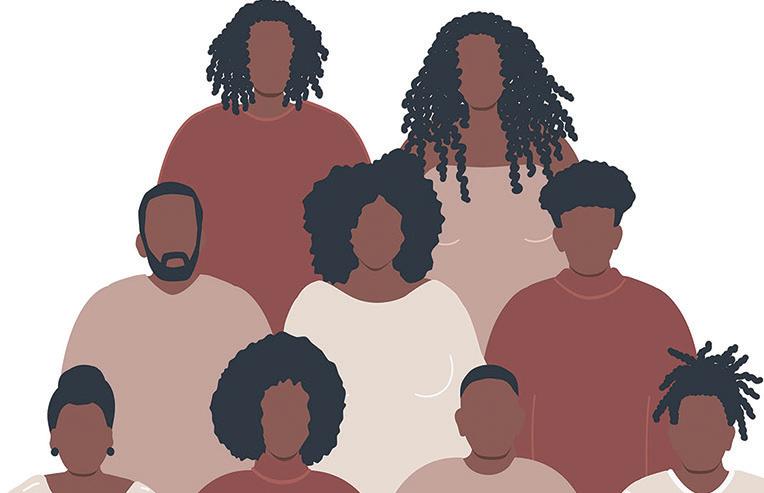

Bakersfield


News Observer
Black Press, Shoppers
Turn Up Heat on Target
By Stacy M. Brown
Black Press USA Senior National Correspondent Target’s reputation and in-store traffic continue to spiral downward as new data reveals the toll of its decision to pull back on diversity, equity, and inclusion (DEI) initiatives. According to TheStreet, the Minneapolis-based retail chain has suffered four consecutive months of year-over-year foot traffic declines, including a 9% drop in February, followed by 6.5% in March, 3.3% in April, and 1.6% in May. Placer.ai’s latest analytics confirm that Target is losing ground to competitors like Walmart and Costco, who have posted gains during the same period. The company’s retreat from DEI was confirmed in January when it ended antiracism training, stopped promoting Black-owned businesses, and abandoned its participation in the Human Rights Campaign’s corporate equality survey. It also scrapped its internal DEI goals, sparking immediate backlash from civil rights groups, Black consumers, and Black-owned media.“This has raised a red flag to Black America,” said Dr. Benjamin F. Chavis Jr., president and CEO of the National Newspaper Publishers Association (NNPA). “We’ve not had direct communication with Target’s CEO, Brian Cornell, and we intend to intensify our efforts to get this issue resolved in the interest of 50 million African American consumers across the nation.” The NNPA launched a selective buying and public education campaign after Rev. Jamal Bryant’s “Target Fast” attracted nearly 200,000 supporters. The NAACP issued a consumer advisory citing Target’s broken promises on racial justice. The anger has not subsided.“Target’s manipulated silence toward the Black Press sends a powerful and troubling message to Black America—that our voices, platforms, and influence are expendable,” said Bobby Henry, publisher of the Westside Gazette and NNPA chairman. “True diversity requires long-term investment. When companies pull back, we must do the same. Black
“Let’s

consumers are speaking with their dollars every day.” Tracey Williams-Dillard, publisher and CEO of the Minnesota Spokesman-Recorder, which operates near Target’s corporate headquarters, criticized the company’s DEI reversal as ill-timed and harmful. “The timing was disturbing,” she said. “It was a slap in the face.”The company’s performance shows clear consequences. Target reported a 3.8% drop in comparable in-store sales during the first quarter of 2025. Cornell, on a recent company earnings call, admitted “we’re not satisfied” with the performance and pointed to “the reaction to the updates we shared on Belonging in January” as one of several headwinds. According to Caliber, Target’s reputation has also suffered, with its Integrity and Leadership Scores both dropping from 65 to 58. The company’s Recommendation Rate fell nearly 25% between January and May.
The latest Business Insider review of Target stores in Wisconsin, California, and Washington, D.C., uncovered inconsistent customer experiences. Some stores were clean and organized but lacked foot traffic, while others had locked-up products, out-of-stock inventory, and insufficient staff to assist customers. In one D.C. location, shoppers frequently had to hunt down employees to access basic items behind security cases. Despite the backlash and boycotts, Target says it remains committed to inclusion. “Target is absolutely dedicated to fostering inclusivity for everyone – our team members, our guests, and our supply partners,” a company spokesman told Black Press USA. “Today, we are proud of the progress we’ve made since 2020 and believe it has allowed us to better serve the needs of our customers.”
Talk About Juneteenth”
California Leaders Celebrate “Foundational”
By Tanu Henry California Black Media
Elected officials in California, including Gov. Gavin Newsom and members of the California Legislative Black Caucus (CLBC), last week commemorated Juneteenth, a holiday recognized each year to mark the end of slavery in the United States.
Juneteenth, long celebrated in various Black communities in California and across the United States, was enshrined into law in 2021 as a federal holiday by former President Joe Biden.
“There was no pathway of immigration to this country for Black Americans. We didn’t emigrate to this country. We were stolen and brought to this country,” said Assemblymember Isaac Bryan (D-Los Angeles), vice chair of the CLBC, on the floor of the Assembly on June 20.
Bryan made the statement as he urged his colleagues to vote for Assembly Concurrent Resolution (ACR) 90 introduced by fellow CLBC member Assemblymember Mike Gipson (D-Carson) and the other members of the CLBC.
“Immigration was a pathway for people,” continued Bryan. “We were thought of as property -- chattel property to be bought, sold and traded, and raped and maimed, and so much else.”
Bryan reminded the California Assembly that there were 14 generations of Black Americans who were enslaved in the United States.
“For 160 years, we’ve been celebrating Juneteenth. That’s not nearly as long as we were enslaved in this country. The original Juneteenth flag is red, white and blue. Black Americans are foundational to the building of this country. There is no America without folks who were enslaved,” added Bryan who titled his Juneteenth post on BlueSky, “Let’s Talk About Juneteenth.”
Bryan seemed to be making an implied reference to the federal government’s pronounced silence on the Juneteenth holiday this year. There was no official proclamation from the White House and no statements issued from agencies or departments, a departure from past acknowledgments of Juneteenth – even before it became an official holiday.
“I am honored to present ACR 90,” said Gipson, “a resolution recognizing a day of profound historic significance.
Juneteenth, celebrated each year on June 19, marks the day in 1865 when enslaved African Americans in Galveston, Texas, finally learned they were free -- more than two years after President Abraham Lincoln issued the Emancipation Proclamation. The news, delivered by Union General Gordon Granger, arrived late but brought the promise of long-overdue liberation to those enslaved people in Texas.
On Juneteenth, Gov. Gavin Newsom issued a proclamation signed by him and Secretary of State Shirley N. Weber.
“July 4 is not the only day America celebrates
its independence,” the Governor’s proclamation
in justice and equity that Black communities still
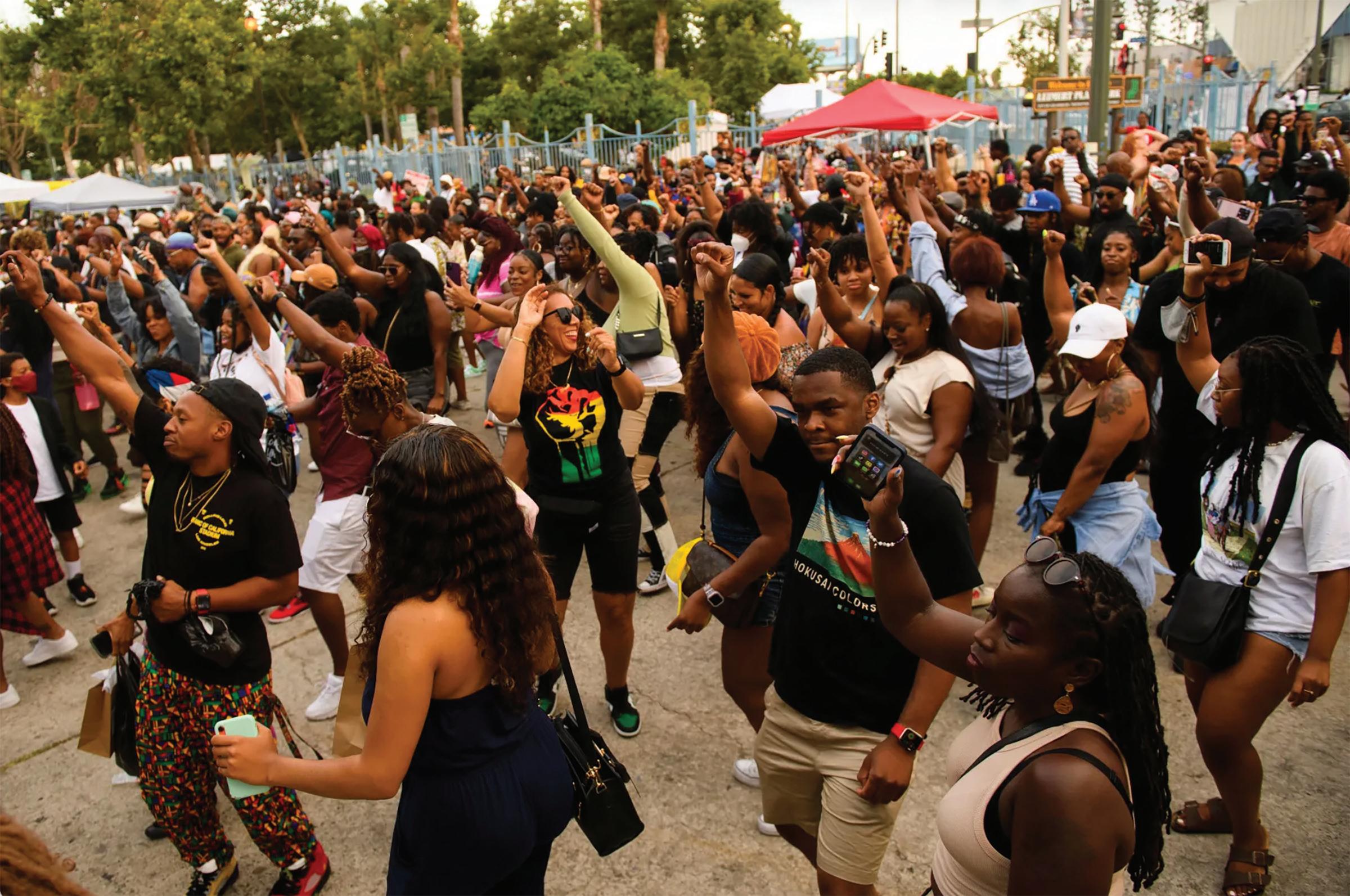
and cultural expression in the heart of South Los Angeles. The annual event highlights the vibrancy and resilience of the Black community. (Photo Credit: Courtesy of LAist / Juneteenth Festival 2024)
began.
“Thousands of enslaved people were finally freed, more than two years after President Lincoln signed the Emancipation Proclamation. Over the next several decades, Black Americans who journeyed out of the South in search of better lives brought Juneteenth celebrations with them. The thousands who settled in California, especially in Los Angeles and the San Francisco Bay Area, taught our state that America’s struggle for freedom did not end in 1776 or 1865, but continues to this day,” the Governor’s statement continued. “California is proud to recognize Juneteenth as an official state holiday.”
Sen. Akilah Weber Pierson (D-San Diego) spent the day attending various events in her district.
“I had a wonderful time celebrating Juneteenth across our community,” she said. “From the vibrant energy at the La Mesa Juneteenth celebration to the incredible music and culture at the North Park Juneteenth, it was a joy to be surrounded by so much Black excellence and unity.”
State Controller Malia Cohen said she is proud to be “a part of a new generation of leaders turning remembrance into real action.”
“I reflect not just on the delayed news of emancipation in 1865, but on the continued delays
face. Juneteenth reminds us that freedom is not a finish line -- it’s a commitment,” she wrote on Facebook.
On the Assembly floor, Assemblymember Rhodesia Ransom (D-Stockton) said, “Thanks to the passion and sacrifices of those who came before me that I have the privilege to stand before you today advocating on behalf of our people and urging that we continue to recognize our legacy.”
Assemblymember Corey Jackson (D-Moreno Valley) said, “We all must use Juneteenth as a way to celebrate liberation and to ensure that future generations are not born in the shadows of discrimination, anti-Blackness, hate, racism and xenophobia.”
Assemblymember LaShae Sharp Collins (D-San Diego) asked all Californians to renew their commitment to advocacy and the fight for justice.
“I think about everything that is going on right now in this nation,” said Sharp Collins. “Celebrate (Juneteenth) – meaning reaching back to look forward. Renew your commitment to defend our freedoms, to honor our history and continue to fight for what was promised to all of us.”
On Instagram, Los Angeles Mayor Karen Bass posted, “Today, we celebrate freedom, resilience, and the ongoing fight for true justice throughout this country.”
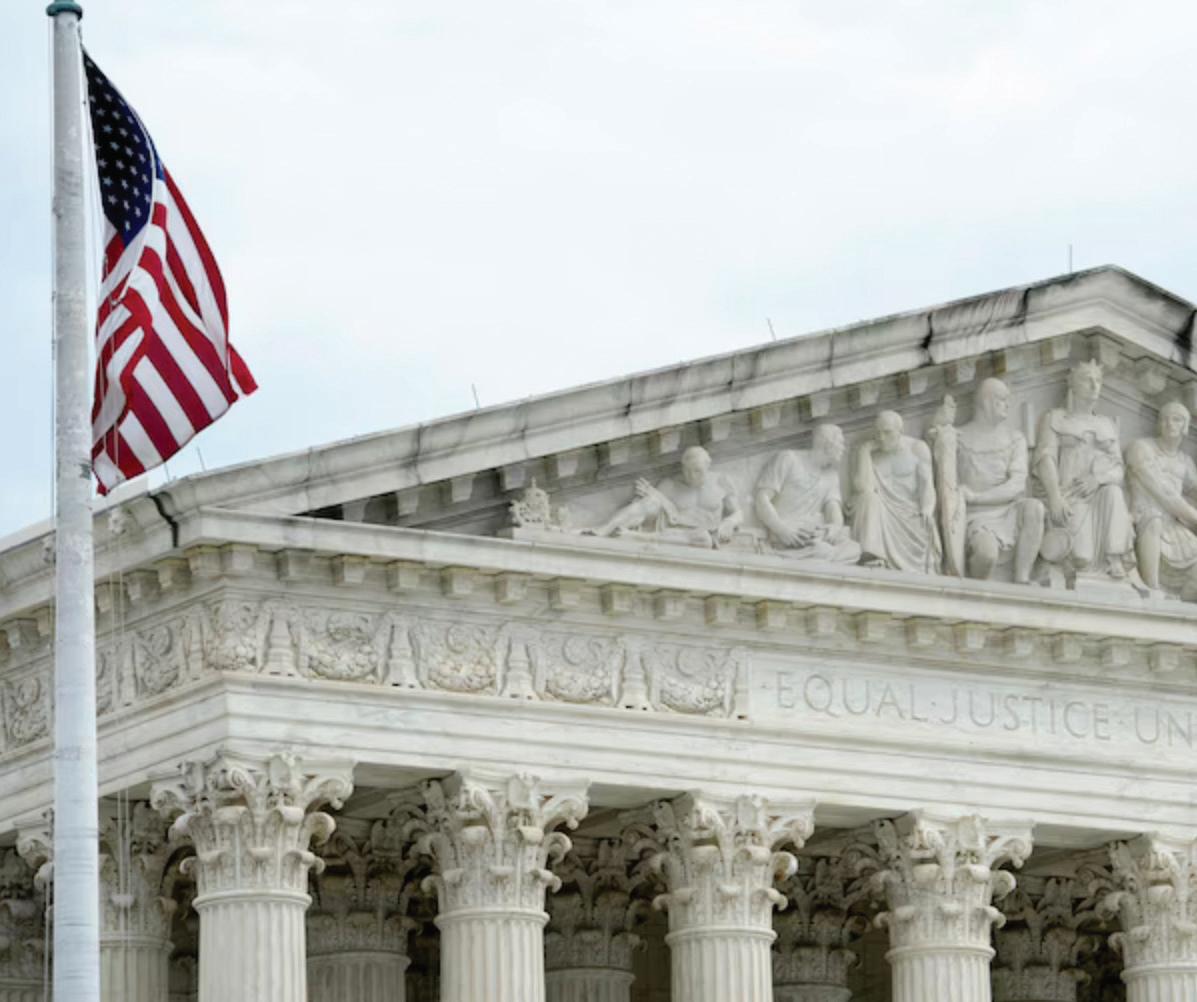
Supreme Court rejects toy company’s push for a quick decision on Trump’s tariffs
WASHINGTON (AP) — The Supreme Court on Friday rejected a push from an Illinois toy company asking for a quick decision on the legality of President Donald Trump’s tariffs. Learning Resources Inc. wanted the justices to take up the case soon, rather than let it continue to play out in lower courts. The company argues the tariffs and uncertainty are having a “massive impact” on businesses around the country and the issue needs swift attention from the nation’s highest court. The justices didn’t explain their reasoning in the brief order rebuffing the motion to fast-track the issue, but the Supreme Court is typically reluctant to take up cases before lower courts have decided.
An appeals court is set to hear the case in late July.
The company argues that the Republican president illegally imposed tariffs under an emergency powers law, bypassing Congress. It won an early victory in a lower court, but the order is on hold as an appeals court considers a similar ruling putting a broader block on Trump’s tariffs. The appeals court has allowed Trump to continue collecting tariffs under the emergency powers law for now.
The Trump administration has defended the tariffs by arguing that the emergency powers law gives the president the authority to regulate imports during national emergencies and that the country’s longtime trade deficit qualifies as a national emergency.

Nationwide — Kianna Jackson, a 25-yearold African American mother of two, was tragically shot and killed at a McDonald’s in Brandon, Mississippi, leaving behind a 5-year-old daughter and a 3-year-old son. The senseless act of violence unfolded at the McDonald’s located at 132 Stribling Lane. According to police, she was shot by 27-year-old Jhonterryes
Community members gather in Leimert Park for a spirited Juneteenth celebration, featuring music, dance,
(Photo by Sundry Photography)
Kianna Jackson and her two children
Black Americans Face Unequal Burden as U.S. Inches Closer to War
By Stacy M. Brown Black Press USA Senior National Correspondent
As the United States edges closer to possible military action against Iran, history signals a familiar reality for Black Americans: disproportionate risk, unequal support, and a long legacy of being asked to sacrifice more while receiving less. From World War I through Iraq and Afghanistan, Black servicemembers have routinely been overrepresented in combat roles and underrepresented in decision-making positions. Today, although Black Americans make up just over 13% of the U.S. population, they account for nearly 19% of active-duty Army personnel. “When the U.S. goes to war, Black Americans, whether as civilians, enlisted personnel, or military families, often carry a disproportionate share of the burden,” Liscah R. Isaboke, Esq., Managing Partner at Isaboke Law Firm, PLLC, told Black Press USA.“Historically, Black service members have been overrepresented in frontline and high-risk roles while underrepresented in officer ranks,” Isaboke said. “This exposure results not only in increased physical danger, but also long-term disparities in access to VA benefits, career advancement, and mental health care upon return.” That overrepresentation is linked to greater economic inequality. Recruitment data shows the military draws heavily from low-income communities, and Black Americans—more likely to face systemic barriers to college and employment— are disproportionately represented among enlistees seeking stability, education, or opportunity. Once
enlisted, they are less likely to be promoted into leadership roles, often due to bias in evaluation and selection processes. According to the VA’s National Health Study, 21.9% of deployed Black veterans screened positive for PTSD, compared to 14.1% of white veterans. Studies have shown that Black veterans are less likely to receive longterm, culturally competent mental health care and face more barriers to follow-up treatment. Military justice records also reveal that Black service members are more likely to face court-martial than their white counterparts.“Black Americans have historically been overrepresented in the U.S. military while being under-protected both at home and abroad,” Cazoshay Marie, a disability advocate, artist, and writer, wrote in an email to Black Press USA. “From the disproportionate impact of PTSD and other invisible war wounds among Black veterans to the lack of adequate support upon returning home, the psychological and socioeconomic costs of war weigh heavily.”
“Increased military spending often coincides with the defunding of essential programs—education, healthcare, and community infrastructure—which are lifelines in our communities,” Marie said. Those federal divestments have long-term consequences.
education investment, and job training—faced cutbacks. Black Americans, already on the receiving end of wealth gaps and institutional neglect, felt those losses acutely.In their February 2024 essay “The Race Gap That Shapes American Views of War,” published in Foreign Affairs, Naima GreenRiley of Princeton University and Andrew Leber of Tulane University wrote that Black Americans have consistently been less likely than white Americans to support U.S. wars abroad. The authors cited not only political and moral skepticism but also a deeply rooted sense that these wars are carried out in the name of democracy while offering little tangible benefit to Black communities. “Black Americans are more inclined to ask: Is this war just? Will our people gain anything from it? And what are we sacrificing for a country that so often withholds justice at home?” Green-Riley and Leber wrote.
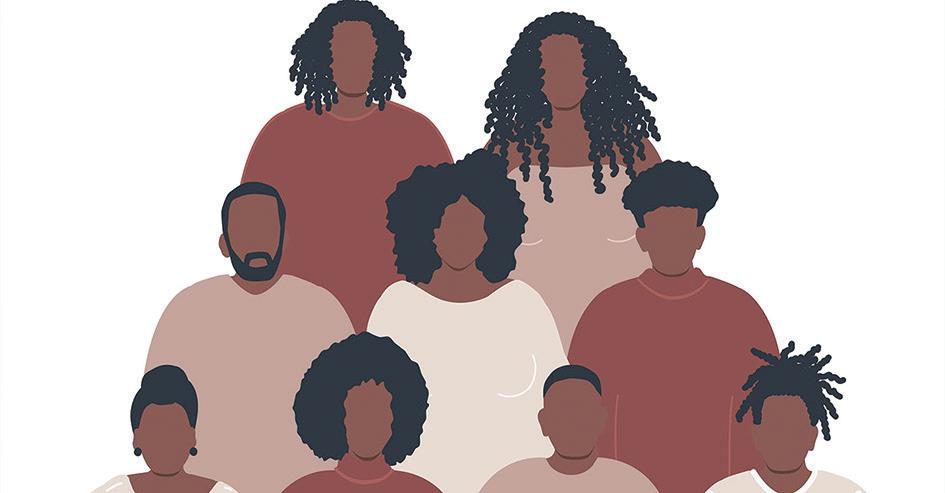
During the post-9/11 wars in Iraq and Afghanistan, it’s estimated that the U.S. spent over $6 trillion on military operations, interest payments, and veteran care. As those expenses ballooned, domestic programs—including housing subsidies, public
The article pointed to cultural responses, including KRS-One’s 2008 track “Our Soldiers,” which critiques the Iraq War and opens with a siren that initially evokes U.S. policing. The song’s hook, “Frontline of the political war,” highlights a dual consciousness: the experience of fighting abroad while being targeted and marginalized at home. “As a historian of public health and policy, I can say that when the U.S. goes to war, Black Americans often shoulder a disproportionate share of both the burden and the consequences—on the battlefield and at home,” Dr. Zachary W. Schulz, of the Department of History at Auburn University, told
Black Press USA. “Historically, military service has been a double-edged sword for Black Americans,” Schulz said. “From the Civil War through Iraq and Afghanistan, Black soldiers have fought for freedoms abroad they were denied at home. Military service offered mobility, education, and sometimes even a pathway to civil rights advocacy—as in the case of the Double V campaign during WWII—but it also exposed Black personnel to racism within the ranks, limited advancement opportunities, and post-service disparities in veteran care.”
“Civilians are also deeply affected,” Schulz said. “Wars often fuel economic shifts and labor demands that open up jobs for Black workers—only to see those gains reversed when the war ends. Wartime policing and surveillance disproportionately target Black communities, and anti-war protest movements led by Black activists—think Muhammad Ali or Martin Luther King Jr.’s ‘Beyond Vietnam’ speech—have historically met with state suppression and public backlash.” “The impact is layered,” Schulz added.
“Black Americans are overrepresented among the fighters, under-resourced in the aftermath, and frequently erased from the national narrative of sacrifice.” “We must tell the full truth,” Isaboke concluded. “Black Americans have always shown up for this country, even when this country has not always shown up for them, especially in times of war.”
Crypto, Golf, and Now Phones: Trump Cashes in on the White House
By Stacy M. Brown Black Press USA Senior National Correspondent
Donald Trump, already under scrutiny for leveraging the presidency to boost his fortune, has launched a new venture — Trump Mobile — while continuing to rake in profits from a vast web of business interests tied to his time in office. Trump Mobile, introduced on the 10th anniversary of his 2015 campaign announcement, promises “top-tier connectivity” through the “T1 Plan” at $47.45 per month. The service includes unlimited data, device protection, telehealth, roadside assistance, and free international calling, particularly for military families. Marketed as a populist solution for “hardworking Americans,” the mobile service expands
Trump’s brand into the wireless market under a licensing deal bearing his name. But this latest launch is just a sliver of Trump’s ongoing effort to monetize the presidency.According to a June 2025 financial disclosure, Trump reported more than $600 million in income from ventures, including cryptocurrency, golf resorts, and licensing deals. He made at least $217 million from Florida golf clubs alone, including $110 million from Trump National Doral. A meme coin called $TRUMP earned an estimated $320 million in fees, and Trump holds billions of governance tokens through his crypto venture World Liberty Financial. While he claims his businesses are in a trust managed by his children, Trump continues to benefit from licensing fees,
including $16 million from a Dubai project, $10 million from India, and $5 million from Vietnam. He also made money from Trump Watches, NFTs, Bibles, and other branded merchandise.A separate analysis by Forbes reveals that Trump’s wealth more than doubled from $2.3 billion to $5.1 billion in just one year — thanks to post-election crypto mania, a surge in Truth Social stock, and product sales. His digital token project alone reportedly funneled at least $110 million after taxes into his fortune. This builds on earlier reports showing that Trump earned up to $160 million from foreign governments while serving as president. His dealings spanned Saudi Arabia, Turkey, China, India, and other countries, with golf courses and hotels serving as conduits for
For the First Time in its 116 Year History,
foreign interests seeking access and favor. Despite promises to halt international deals, Trump and his sons continued to expand and promote global projects during and after his presidency.Meanwhile, Trump’s taxpayer-funded birthday and military parade reportedly cost $143 million, and his repeated golf trips have already cost taxpayers an estimated $30 million. While Trump’s team insists all disclosures have been filed and ethics briefings completed, critics argue that the lines between Trump’s profit and presidential power have not only blurred — they’ve disappeared.
the NAACP Won’t invite the Sitting President to Their Annual Convention
Bakersfield News Observer
Adjudicated a Newspaper of General Circulation August 11, 1980, Kern County Superior Court Decree, Case No. 16964, Government Code 6023.
Bulk Mailing Permit 724 Bakersfield, CA 93385
Published By Observer Group Newspapers of Southern California, Inc. Corporate Office 1219 20th St. Bakersfield, CA 93301 (661) 324-9466.
Member of The National Newspapers Publishers Association, Associated Press, and The Better Business Bureau
President: Ellen Coley
CEO: Jon Coley
Publisher/ Editor: James Luckey Jr. Operations Manager: James Luckey Intern: William Clark Coley
Credo-The Black Press believes that America can best lead the world away from racial and national antagonisms when it accounts to every person, regardless of race, color, or creed full human and legal rights. Hating no person, fearing no person, the Black Press strives to help every person in the firm belief that all are hurt as long as any one is held back.
The Observer Group Newspapers reserves the right to publish views an opinions that may not necessarily reflect those of the staff and management and are solely the product of the responsible individuals who submit commentaries published in these newspapers. Letters, articles and comments appearing in the Observer Newspapers reflect the opinions of the contributor and do not constitute the opinion or endorsement by The Observer Newspapers or its staff. The Observer Group Newspapers assumes no responsibility for photographs, articles, letters, press releases and unsolicited materials. Decisions as to the editing and publishing of materials are at the discretion of the Publisher and Editors. All rights are reserved on materials accepted for publication unless otherwise specified.
Bakersfield News Observer
Los Angeles News Observer
The Valley’s News Observer
1219 20th St. Bakersfield, Ca 93301 Mailing Address P.O. Box 2341 Bakersfield, CA 93303 Phone (661) 324-9466 Fax (661) 324-9472 Emails and general info: observernews@gmail. com, Advertising: observeradvertising@gmail. com Available online: www.ognsc.com
By
Lauren Burke Citing Trump’s “attacking our democracy,” the National Association for the Advancement of Colored People (NAACP) will not invite President Donald Trump to its national convention this year.
The decision marks the first time that America’s oldest civil rights organization will exclude a sitting president at its convention. In a statement on the evening of June 16, the reasons were made clear. “Donald Trump is attacking our democracy and our civil rights. He believes more in the fascist playbook than in the U.S. Constitution. This playbook is radical and un-American. The president has signed unconstitutional executive orders to oppress voters and undo federal civil rights protections; he has illegally turned the military on our communities, and he continually undermines every pillar of our democracy to make himself more powerful and to personally benefit from the U.S. government,” the statement from the NAACP read in part.The NAACP’s statement referred to President Trump’s recent decision to send the National Guard to Los Angeles after protests against ICE detentions and abductions sent fear through parts of the Los Angeles community. The White House responded to the NAACP’s June 16 statement. “The NAACP isn’t advancing anything but hate and division, while the President is focused on uniting our country, improving our economy, securing our borders, and establishing peace across the globe. This is
the same vision for America that a record number of Black Americans supported in the resounding reelection of President Trump,” stated White House spokesperson Harrison Fields said in a written statement. Since he took office in January 2025 for his second term in The White House there has been a clear anti-Black policy focus pushed by the Trump Administration. Trump and members of his cabinet have constantly attacked diversity and inclusion since taking office.The Trump Administration has also fired without cause several Black officials in top roles such as General CQ Brown, who was Chair of the Joint Chiefs of Staff, and Dr. Carla Hayden, who served as the Librarian of Congress. It was reported in early April that books on racism civil rights and the Black experience have been removed from the library at the U.S. Military Academy in Annapolis. The reason was the stated policy by the Trump Administration against “diversity” and “inclusion.”“For 116 years, the NAACP has invited the sitting president of the United States to address the NAACP National Convention — regardless of their political party. There is a rich history of both Republicans and Democrats attending our convention — from Harry Truman to Dwight D. Eisenhower, Ronald Reagan, Bill Clinton, George W. Bush, Barack Obama, and beyond. We’re nonpartisan and always welcome those who believe in democracy and the Constitution,” the organization led by Derrick Johnson, also stated.

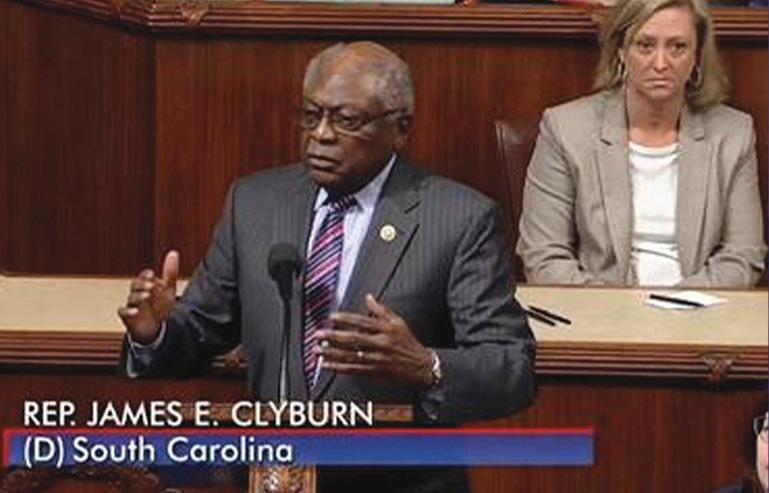
Donald Trump
Republican Presidents Ronald Reagan and George W. Bush addressed racism during their speeches to the NAACP. The organization’s annual convention
is one of the largest gatherings of Black leadership in the U.S. each year.
Congressman James E. Clyburn speaking at the Mother Emanuel AME Church in Charleston, South Carolina
Meet Dystany Spurlock, the Black Woman Motorcycle Drag Racer Who Continues to Make History
Foxxtecca is making history with professional motorcycle drag racer Dystany Spurlock, who became only the second Black woman in history to compete in the NHRA Pro Stock Motorcycle class when she took the track at the Virginia NHRA Nationals on June 20 at Virginia Motorsports Park. Spurlock joins trailblazer Peggy Llewellyn in one of motorsports’ most exclusive and underrepresented clubs, women of color competing at the sport’s highest level.
“Since 2021, I’ve been working behind the scenes with Dynasty Spurlock to help her reach the next level in her career,” said Chris Harris, co-founder of Foxxtecca, a media and mobility company focused on culture and equity. “In my eyes, she checks every box. Unfortunately, many of the companies we approached weren’t willing to provide the financial backing needed to take that
next step, so my partner and I, Kellie Crawford, made the decision to invest in her ourselves.
“We’re not shying away from the DEI conversation; we’re embracing it fully as we continue to break barriers. Foxxtecca may be a small company with limited resources, but we believe in Dystany and understand the impact of her visibility at this level. Our hope is that this moment inspires larger companies to recognize her talent and come alongside her for a full-time campaign in 2026.”
Spurlock debuted as part of Arana Racing, a respected father-son team led by Hector Arana Sr. and Hector Arana Jr., both champions and innovators in motorcycle drag racing. The partnership marks a powerful cultural milestone, bringing together Black and Hispanic excellence on one of drag racing’s biggest stages.


Ex-Husband of Wendy Williams Files $250M Lawsuit on Her Behalf, But His Motives Are Questioned
— Wendy Williams’ ex-husband, Kevin Hunter, has filed a $250 million lawsuit, claiming she was abused, overmedicated, and financially exploited under her guardianship. The suit names 48 defendants, including her guardian, a judge, Wells Fargo, and several lawyers, and accuses them of violating Williams’ rights. According to People, the suit, filed on June 17th, does not seek to end the guardianship but calls for major changes. Hunter wants the court to appoint
By Dr. Chanell Dingle-Sermon
Liberty University, and a Doctorate in Education with a Specialization in Curriculum and Instruction from Capella University. To learn more about Dr. Chanell DingleSermon and her journey, visit IAmPrettyDoc.com Follow her and other delegates on Instagram at @unitedcrownofamerica
accuses Wells Fargo advisor Lori Schiller of paying $60,000 from Williams’ account to a doctor who declared her mentally unfit. Hunter further alleges that her court-appointed lawyer and certain financial institutions financially supported Judge Sokoloff’s re-election, pointing to a potential conflict of interest.
estimates Williams has lost roughly

Pride 2025: Black LGBTQ+
Californians Lean on History -- and Each Other -- in the Face of Growing Hate
By Edward Henderson California Black Media
Natasha Hooper, a poet and event host in San Diego, said she is commemorating LGBTQ+ Pride Month by honoring Black historical figures – often overlooked or underappreciated by the broader LGBTQ+ community -- and celebrating in solidarity with other African Americans.
Hooper emphasized the need to strengthen community bonds, especially as LGBTQ+ people face growing hate and shrinking rights.
Hooper said she and her friends plan to attend Pride events that celebrate Black people including picnics, pool parties, music events and networking opportunities.
“I grew up very much closeted and it took me a while to kind of come into my own with my queerness, Hooper told California Black Media. (CBM).
“However, as an adult, I think it’s an important time to acknowledge our Black history in the LGBTQ+ community and the people who have fought and sacrificed for the freedoms we have now. Some of those people having fought for Civil Rights at the same time; Bayard Rustin, Marsha P. Johnson, James Baldwin and others. I think it would’ve also made life for my younger self a lot less lonely knowing I could be living the life I am now.” Hooper added.
According to the most recent survey conducted by the California Civil Rights Department (CRD) in partnership with the UCLA Center for Health Policy Research, Lesbian, gay, bisexual, and pansexual (12%) and transgender (19%) adult respondents were more
likely to experience hate than Californians overall.
Researchers surveyed more than 20,000 households on health and hate related questions for the report.
One year after Gov. Gavin Newsom officially proclaimed June as LGBTQ+ Pride month, the current political and social climate in the country has raised questions on how celebrations like Pride will be regarded by the mainstream in the future.
“This month, we celebrate the resilience of the LGBTQ+ community and their hard-fought victories to advance acceptance and equality,” said Newsom in a release after proclaiming June Pride month. “We must also rededicate ourselves to the continued fight -- standing together, united, to protect and build on our progress toward a better, more inclusive, and safer future for all.”
This year, some corporations that previously aligned themselves with LGBTQ+ celebrations and campaigns have begun to decrease or drop their support as they align with the Trump administration’s anti-diversity posture.
Gravity Research, a risk management advisory firm, reports that 39% of corporations say they plan to scale back public Pride Month engagements this year, according to a survey of more than 200 executives. That includes sponsoring Pride events, posting supportive messages of LGBTQ+ rights on social media and selling Pride-themed merchandise.
“It’s clear that the administration and their supporters are driving the change,” said Luke Hartig, the president of Gravity Research. “Companies are under increasing pressure not to engage and speak out on issues.”
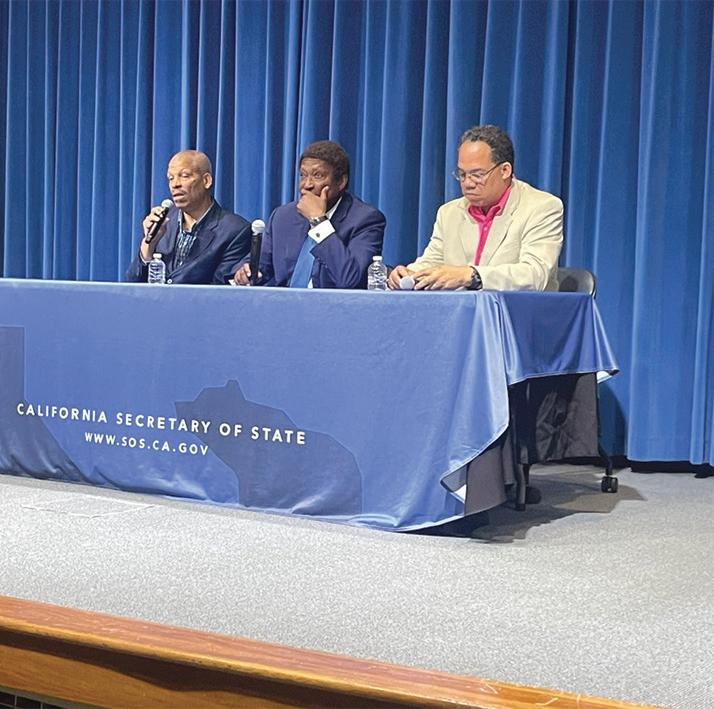
civil rights attorney John Burris seated alongside the film’s producer and filmmaker, reflecting on his legacy and ongoing fight for justice and police accountability. CBM Staff photo
Sixty-five percent of companies in Gravity Research’s survey said they were preparing strategies to respond to blowback. A growing number of chains, including Walmart, Target, Kroger, have also been warning investors about the risks of consumer boycotts over corporate positions on social issues.
Despite the blowback, Black members of the LGBTQ+ community in California are planning to stand strong and ensure that their voices are heard and history is honored.
According to a report from eScholorship, there are an estimated 55,000 Black LGBTQ adult members in California. This group represents 3.2% of the state’s Black adult population, which is higher than the national average. Additionally, there are roughly 7,400 Black men and women in same-sex relationships in California. Since many individuals do not share this information with data collectors, the number could be significantly higher.
Part of the history that Hooper acknowledges includes the 1969 Stonewall riots in New York, which are credited with starting the LGBTQ+ movement in the United States that sparked Pride month celebrations nationwide.
Further highlighting the importance of this history is what Hooper sees as the co-opting of Pride month by some White LGBTQ+ people.
“You see a lot of gay cis White men kind of embodying Black women, and their mannerisms -- how they speak and different things,” said Hooper.
“It’s interesting because obviously they care about pride and all of the community, but we are still a subset
of LGBTQ people,” she added. We are still sort of the minority of the

community. There a lot of other ethnicities co-opting and borrowing
and experiences. At the same time, they are centering Whiteness, which can be very frustrating.” Los Angeles Black Pride, taking place over July 4th weekend, is the premiere event in California with multiple parties and gatherings geared toward Black LGBTQ+ people. San Diego also hosts a prominent Black Pride Festival. Another well-attended event
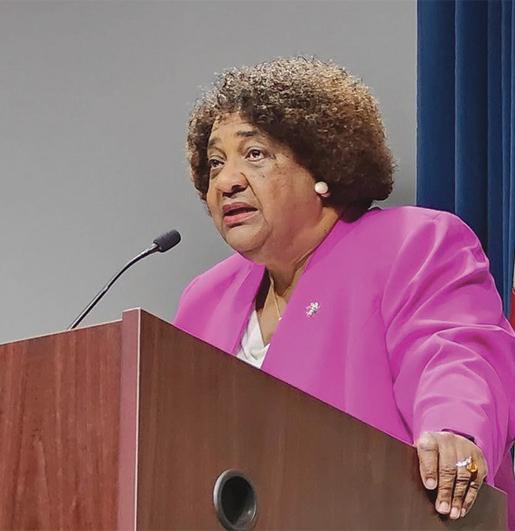
The Godfather of Litigation: Black Caucus, Sec. Weber Spotlight Civil Rights
Sacramento
By Fahizah
On June 16, California
and the California Legislative
(CLBC) hosted an event in Sacramento
State
a film focused on the extraordinary career of Oakland-based civil rights attorney John Burris.
Elected officials, state employees, advocates, and others attended the 90-minute screening of the documentary film titled “John Burris: The Godfather of Litigation” at the California Museum in Sacramento. Burris participated in a panel discussion and Q&A session after the film along with filmmaker Doug Harris and producer Brian Spencer. Over the years, Burris, who is now 80, has won millions of dollars for clients in high-profile police brutality cases - Rodney King, Oscar Grant, Celeste Guap, Hung Lam, Melvin Black and the Oakland Riders. But the case that perhaps most rattled the soul of Burris, California’s preeminent civil rights attorney, is the one where authorities attempted to prosecute a six-yearold Black boy from Richmond for attempted murder in the assault on an infant.
“I told prosecutors that there was no way that I was going to let them do that to that child,” Burris said recently. “Absolutely no way! They would have to get by me.” He won that battle and many other landmark cases
in a career that has spanned more than 40 years. Burris has also mentored a number of attorneys, including current legal star Ben Crump. Tall, soft-spoken, but emphatic, Burris joined a post-screening panel with the filmmakers to reflect on his long career fighting injustice.
A 1973 graduate of the University of California, Berkeley Law School, (formerly Boalt Hall), Burris has practiced law for over four decades and has gone to trial for some 1,000 civil rights cases, including representing the late Tupac Shakur, NBA All-star Gary Payton, Barry Bonds and Sacramentan Joseph Mann.
Burris, who grew up in Vallejo, earned an MBA from Cal Berkeley before turning to law.
His work on police brutality cases began in 1979 when he was an investigator in the district attorney’s office in Oakland working on the case of the killing of 14-year-old Melvin Black. The case, he says, fueled his passion, courage and lifelong legal work that garnered nationwide attention and acclaim.
Burris also authored a 1999 book about the problem of police brutality against African Americans titled “Blue V. Black.”
“In many ways it’s like I’ve been a crusader and a champion for a lot of people who otherwise would not have had representation,” Burris told the dozens gathered for the screening.
His words stirred the audience.
“This is so impactful because he is still alive,” said Weber. “He is a living legend. History is not way back. People can see history and talk to him and ask why he did what he did. We don’t have to speculate.”
Sacramento-based civil rights attorney and law professor Mark Harris attended Boalt Hall a decade after Burris. For him, the legal giant was a role model -and, later, a personal mentor – who was instrumental in inspiring and guiding his own career in law.
“Over the years, I have worked with John, and so have my sons,” said Harris. “So, I was very happy to be in the audience today to celebrate his unparalleled career and see his phenomenal story told in this very well sourced documentary.”
Former San Francisco mayors Willie Brown and London Breed are among those interviewed in the film.
Harris and Spencer, who both live in Folsom, interviewed some 20 people for the documentary.
The film was produced as part of a Cal Alumni Profiles documentary series, which was the creation of Spencer, who is a graduate of UC Berkeley’s African American Studies Department.
“The project highlights the outstanding achievements of some of UC Berkeley’s prominent alumni who haven’t really had their stories told,” said Harris. So, John Burris presented an extremely highprofile figure who was a perfect fit for our documentary
series project. One of the most compelling things to me throughout the production of John’s life story, was the high number of civil rights cases he’s been involved with and the incredible amount of national media coverage he has received over his long career was eye opening for me.” Harris has been producing documentary films for more than 25 years.
“The process in many ways is similar to writing a book,” he said. “There’s a whole lot of learning you have to do before you even start the research phase to produce a compelling documentary story such as John’s, and these things don’t happen quickly. It takes a whole lot of time and planning to execute the production of a quality documentary story. The film has been on tour, stopping in various California cities. Spencer said he expects it to be distributed by PBS and it could be broadcast on television later this year.
“The film is an important reminder about the importance of legal efforts to combat police brutality given the current administration’s retreat from investigating police departments over civil rights violations,” he said.
“I hope California legislators and others who came out to see this film, will emphasize to the public the importance of addressing racial justice in policing, because unfortunately police misconduct is still happening.”
LGBTQ+
Black culture
Panel discussion following the community screening of “The Life of John Burris,” featuring
Secretary of State Dr. Shirley Weber welcomes guests to the screening of “The Life of John Burris” at the Secretary of State Auditorium in Sacramento, California. Photo by Antonio R. Harvey, California Black Media.
Alim California Black Media
Secretary of
Shirley Weber
Black Caucus
featuring
Disabled Californians Promise to Fight
Back as Sacramento Proposes Cuts to Services They Rely On
By Antonio Ray Harvey California Black Media
The California Disability Leadership Alliance (The Alliance) held its “Day at the Capitol” event on June 16, organized to advocate for policies and services that improve the lives of people with disabilities. The effort’s

about
experience
leaders also want to strengthen what they refer to as “cross-disability collaboration” in the state.
Eric Harris, Associate Executive Director at the Sacramento-based Disability Rights California (DRC), said voices representing people with disabilities need a seat at the table when decisions are being made.
He added that people with limited abilities won’t “sit or stand” for some of the budget reductions some lawmakers and the Governor’s office are proposing that will directly impact them.
“It’s really important that folks in that building (State Capitol) hear us and see us,” said Harris, who is also an attorney.
“We’re not going to go for coercive approaches to mental health and homelessness, Harris continued. “We’re not going to stand for cuts to services that we depend on every day, including in-home support services.”
The Alliance of organizations that participated in the “Day at the Capitol” event was comprised of leaders from disability advocacy and service-focused organizations, including DRC, the California Foundation for Independent Living Services (CFILS), NorCal Services for Deaf and Hard of Hearing, Disability Rights Education and Defense Fund, and Cal Voices.
“We need this moment of power,” said Russell Dawson Rawlings, CFILC’s Communications and Strategic Partnerships Manager.
Assemblymember Isaac Bryan (D-Ladera Heights), known for his advocacy work on issues related to disability rights, was one of the guest speakers, along with Assemblymember Liz Ortega (D-Hayward).
Bryan, the vice chair of the California Legislative Black Caucus, said he and Assemblymember Tom Lackey (R-Palmdale) are working on a number of bipartisan bills focused on improving disability services. He also shared that he and other lawmakers are concerned about probable cuts to the In-Home Supportive Services (IHSS) program.
Gov. Gavin Newsom’s proposed budget cuts for the IHSS program include a reduction of $707.5 million in General Fund spending, mostly through capping provider overtime and travel hours from 66 hours per week to 50.
The IHSS program provides in-home assistance to eligible aged, blind, and disabled individuals.
Bryan said his mother’s experiences as a care worker and a foster parent brace his commitment to advocating for people living with disabilities.
His own memories, too, of growing up in foster care as one of the “hardest to place cases,” and having experienced “deep trauma” and knowing other youth with “multiple disabilities” also drive his passion.
“As a legislator, it is important for me to do all that I can so that all of our policies that we move in this big building are just like my mother --someone who sees everybody, inclusive of everybody, and fights for sensibility for everybody,” Bryan said.
“When the governor put out his May Revise Budget and he had major cuts to IHSS with new income restrictions on Medi-Cal, we pushed back. We pushed back hard,” Bryan said. “We were able to stop those cuts to IHSS.”
According to the Department of Justice’s Civil
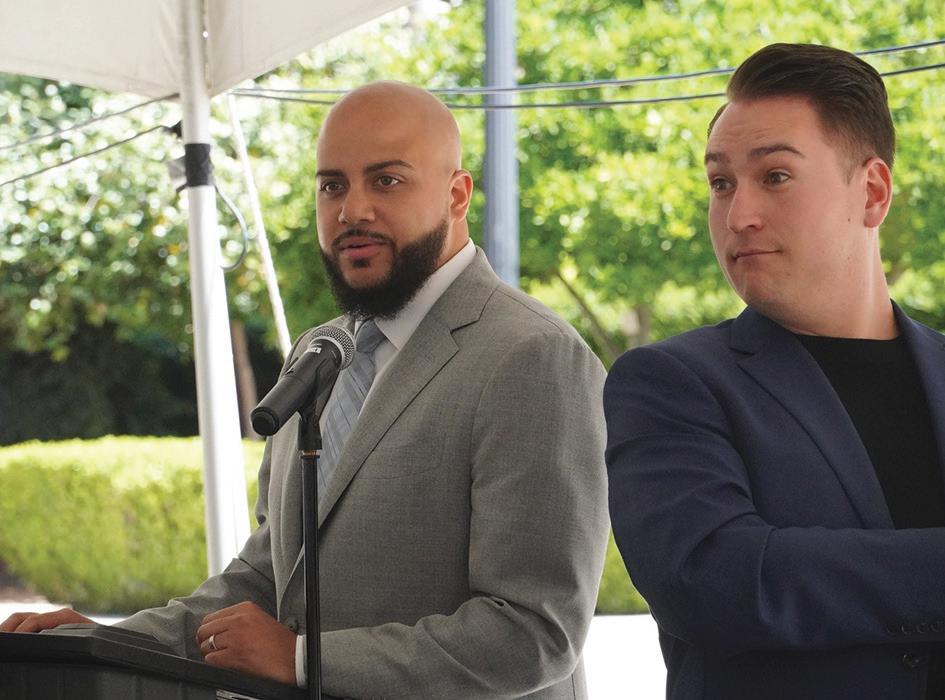
Rights Division, California disabilities are “broadly defined” as conditions that hinder a major life activity, including physical and mental disabilities.
The California Department of Health Care Services (DHCS) reported that one in four adults living in California has a disability. Individuals with disabilities have a higher frequency of certain diseases, higher rates of morbidity and mortality, and risk factors for poor health.
A December 2023 survey by the California Health Care Foundation (CHCF) found that Black Californians with disabilities are more likely than those without disabilities to be covered by Medi-Cal (30% vs. 20%) or Medicare (32% vs. 14%), and less likely to have private insurance (34% vs. 64%).
That same survey revealed that approximately 19% of Black Californians reported having a disability, and people in that group are frequent users of the health care system.
The Los Angeles-based, Black-owned research firm EVITARUS conducted the “Listening to Black Californians” study for CHCF in 2021.
Assemblymember Jeff Gonzalez (R-Indio) says he has a personal reason to be concerned about cuts to IHHS. He is father to a son named R.J., who has severe disabilities due to Cerebral Palsy (CP) with spastic quadriplegia, the most severe form of CP.
Gonzalez told California Black Media (CBM) that R.J. needs personal care “around the clock” -- a wheelchair assistant, nutrition, hygiene, medication, therapy, and social interaction.
Gonzalez feared that cutting in-home care workers’ hours would lead to multiple issues. Parents would have to spend more time at home than work. It could also lead to patients experiencing severe depression should they be unable to communicate their needs, or it could leave parents with no choice but to place their loved ones in mental institutions.
“The governor’s proposal to reduce IHHS overtime hours from 70 to 50 hours isn’t just a budget cut. It’s a direct blow to families like mine,” Gonzalez said. “It means fewer hours of trained care. It means that a parent working full-time as a caregiver may suddenly lose critical
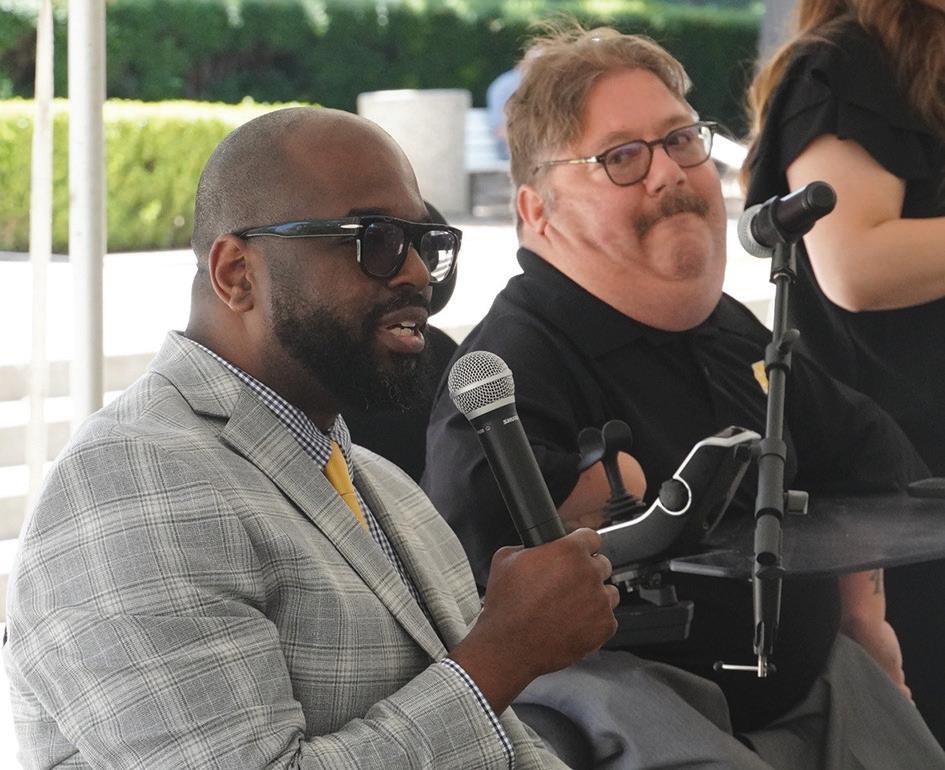
hours of paid support and may be forced to go it alone.”
Matt Scott, a Black five-time Paralympian and twotime gold medalist for Team USA Wheelchair Basketball, was one of the speakers at the event held in front of the State Capitol. He said people with disabilities are connected to a “capable community,” but services that are offered by the state are sorely needed.
“These are some challenging times,” said Scott, who was inducted into the Wheelchair Basketball Hall of Fame. “But that’s the power of adaptive sports. It taught me how to advocate, communicate, be a leader, and rise above challenges. That’s why I came here to support our cause.”
Newsom’s Message to Trump Administration on California Power Grab Is Clear -- He’s Not Backing Down
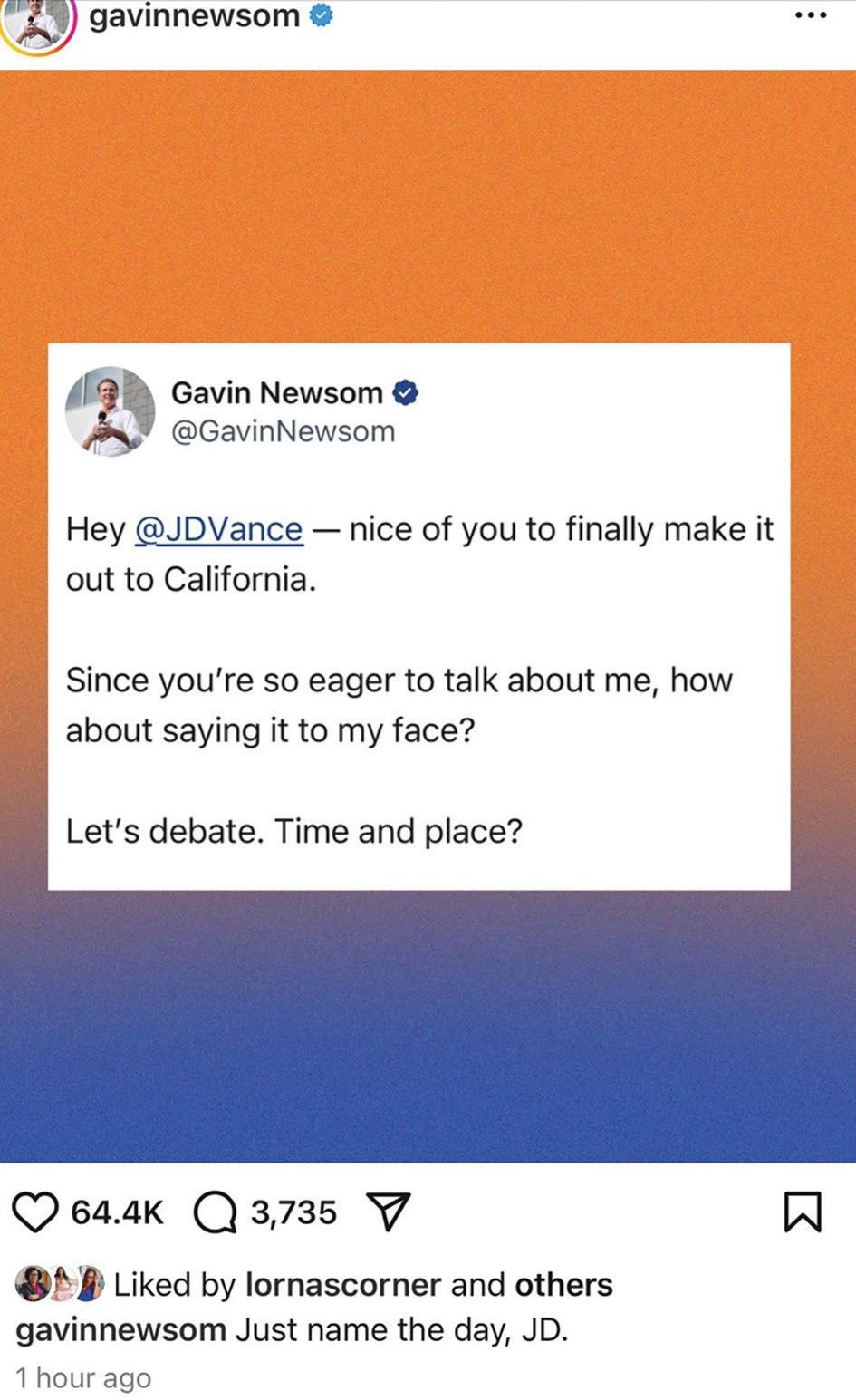
By Joe W. Bowers Jr.
California Black Media
For months, Pres. Donald Trump and his allies have used California as a political punching bag.
But Gov. Gavin Newsom, who has never shied away from a political brawl -- especially with Trump -- is speaking with new force, especially after Trump’s decision to federalize the California National Guard and deploy 4000 troops and 700 U.S. Marines to Los Angeles without state approval.
Calling the deployment “unauthorized, unconstitutional, and reckless,” Newsom sued the Trump administration in federal court. He also argued that Trump’s military intervention in Los Angeles violates the Posse Comitatus Act and undermines the state’s constitutional right to self-governance. The lawsuit demands that federal forces be withdrawn and that California regain control over its National Guard units. While legal scholars debate the strength of the claim, Newsom is betting that both the courts and public opinion will side with California.
Then came JD Vance.
The Vice President’s trip to Los Angeles last week was meant to deliver a message: California is out of control, and Trump is taking charge. But instead of making the case, Vance gave Newsom exactly what he wanted -- a reason to fight, publicly and unapologetically.
Vance’s visit was short, but it was long enough to ignite controversy and underscore how sharply Newsom is responding to the Trump administration’s overreach.
Vance landed at Los Angeles International Airport at 1:35 p.m., arrived at the federal building in Westwood by 2:00 pm to meet with Marines, federal agents, and police, then staged a news conference at 3:11 p.m. in front of a fire truck—ignoring the fact that communities across Los Angeles were still recovering from devastating wildfires. The moment, scripted and performative, was like it came straight from central casting— visually polished but out of touch with the reality on the ground. By 3:30 p.m., he had left for a highdollar Republican National Committee fundraiser at the Beverly Hills Four Seasons, and by 6:05 p.m., he was back on Air Force Two -- gone from LA in under five hours.
As Newsom’s press office posted on X:
“It was very generous of the Vice President to take time out of his closed-door fundraiser to stage a photo op in front of a fire truck -- where he mistakenly called a Latino U.S. Senator ‘Jose.’” Vance had referred to Sen. Alex Padilla, his former Senate colleague, as “Jose Padilla,” a name associated with a convicted terrorist. Newsom didn’t let it slide.
“JD Vance served with Alex Padilla in the United States Senate. Calling him ‘Jose Padilla’ is not an accident,” Newsom posted on X. Then came the challenge:
“Hey @JDVance -- nice of you to finally make it out to California. Since you’re so eager to talk about me, how about saying it to my face? Let’s debate. Time and place?” Newsom posted on Instagram. This was the latest in a string of increasingly
pointed responses from Newsom -- proof that he’s not just defending California’s autonomy but taking on the fight on his own terms. Vance made no effort to engage with the communities affected by the unrest or wildfires. Newsom posted that local leaders like Victoria Knapp of the Altadena Town Council were open to meeting with him and hoped he would acknowledge the wildfire damage and urge the president to approve long-overdue federal disaster aid.
Instead, during his 14-minute press event, Vance blamed Newsom and L.A. Mayor Karen Bass for the protests and accused them of encouraging violence.
Bass fired back. “We kept the peace,” she said. “You parachute into the city, pass all kinds of judgment, and then you leave. You add to the provocation and the division.”
She also blasted Vance for disrespecting Padilla, saying, “You don’t know his name, but you served with him -- and you still do. The Vice President is also the President of the Senate. How dare you call him ‘Jose’? He may look like ‘anybody’ to you, but he’s not just anybody to us. He is our senator.”
Padilla responded on MSNBC: “He knows my name… It’s just an indicator of how petty and unserious this administration is. You’d think he’d take the situation in Los Angeles more seriously.”
Still, this commentary isn’t about Vance’s blunders -- it’s about Newsom’s emergence.
He’s met Trump’s aggression head-on, matching him post for post, lawsuit for lawsuit.
When Trump called for his arrest, Newsom didn’t flinch -- he pushed back.
“The President of the United States just called for the arrest of a sitting Governor. This is a day I hoped I would never see in America … this is an unmistakable step toward authoritarianism,” wrote Newsom.
And when Vance told him to “Do your job,” Newsom hit back:
“Do YOUR job. We didn’t have a problem until Trump got involved. Rescind the order. Return control to California.”
For Newsom, this is no longer just a clash of personalities or party platforms – it’s a constitutional line in the sand.
Trump’s move to override local control hits especially hard in communities of color that have long experienced the harm of militarized policing. Newsom gets that. His response isn’t just legal -- it’s personal, forceful, and unflinching.
By going head-to-head with Trump and Vance, Newsom isn’t just defending California -- he’s doing it with clarity, conviction, and a willingness to confront power directly. In a political moment defined by noise and posturing, his plainspoken rebukes are cutting through.
Newsom’s words matter. He’s not just talking back. He’s pushing back, boldly and effectively. And people are taking notice. About the Author Joe W. Bowers Jr., a contributing editor at California Black Media, is a graduate of Stanford University.
Eric Harris from Disability Rights California, left, and Russell Dawson Rawlings from California Foundation for Independent Living Centers, right, hosted the event at the State Capitol on June 16. CBM photo by Antonio Ray Harvey.
Alongside a sign language interpreter, Asm. Isaac Bryan (D-Ladera Heights), left, shares his experiences of living in foster care with individuals with disabilities. CBM photo by Antonio Ray Harvey.
Paralympian Will Scott talks
his
of thriving in adaptive sports. CBM photo by Antonio Ray Harvey.
California Capitol News You Might Have Missed Political Playback
By Bo Tefu
California Black Media
California Backs South LA Black Cultural District With $3 Million in State Funding
California is moving forward with a plan to create a Black Cultural District in South Los Angeles, backed by $3 million in state funding secured by State Sen. Lola Smallwood-Cuevas (D-Los Angeles).
The effort aims to formally recognize the historic and cultural contributions of one of the state’s largest Black communities.
The proposed district will honor neighborhoods like the Crenshaw Corridor, Leimert Park, and Historic Central Avenue. The funding will go toward public art, cultural markers, and monuments celebrating Black life, history, and creativity in South LA.
“This is about uplifting the powerful narrative of Black people in California’s history,” said Karen Mack, executive director of LA Commons, a nonprofit leading the community effort. “Everyone has a story to tell, and these stories help build belonging and connection.”
The district will be formally proposed to the California Arts Council, which oversees official state cultural district designations. Supporters say it will help protect Black heritage in the face of growing threats, including gentrification, displacement, and climate disasters.
Smallwood-Cuevas called the initiative a vital step toward long-term cultural preservation. “Without formal efforts like this, our history remains vulnerable,” she said. “I am proud to lead the charge to ensure our communities are seen, celebrated, and protected.”
To mark the occasion, LA Commons will host its annual Day of the Ancestors: Festival of Masks on June 29 in Leimert Park. The event will feature African diaspora art, performance, and ceremony, and include a special appearance by SmallwoodCuevas.
As part of the initiative, LA Commons also released a new report summarizing early community input and design ideas. It outlines a vision for how local artists, designers, and architects can shape the district’s future.
Organizers say this project is about more than one neighborhood. It’s part of a growing statewide movement to recognize and preserve Black cultural assets and ensure they remain a central part of California’s story.
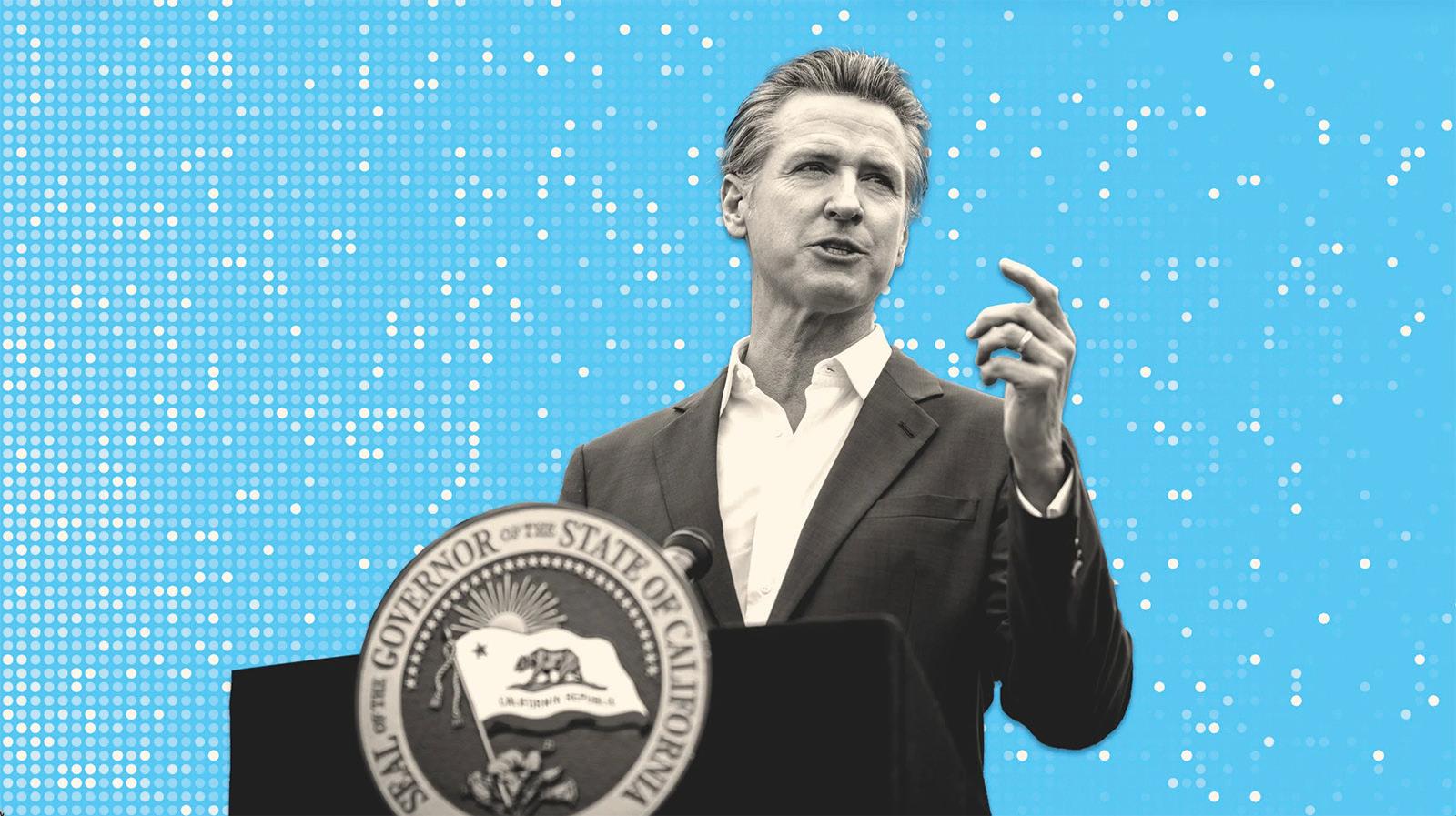
Gov. Gavin Newsom released a report June 17 outlining California’s strategy for the safe and ethical use of artificial intelligence, even as President Donald Trump backs a federal bill that would block states from enforcing key AI-related laws.
The report, The California Report on Frontier AI Policy, was developed by top experts including Stanford’s Dr. Fei-Fei Li, UC Berkeley’s Dr. Jennifer Tour Chayes, and Carnegie Endowment’s MarianoFlorentino “Tino” Cuéllar. It offers a science-based framework for how California and other states can responsibly regulate AI, specifically generative AI, as it evolves.
“California is the home of innovation and technology that is driving the nation’s economic growth -- including the emerging AI industry,” said Newsom. “As Donald Trump chooses to take our nation back to the past by dismantling laws protecting public safety, California will continue to lead the way with smart and effective policymaking.”
The report comes as Trump promotes a 10year moratorium on state laws governing AI, including California’s bans on AI-generated child pornography, deepfake porn, and AI robocall scams targeting seniors.
Newsom convened the expert panel last fall to evaluate the risks and benefits of AI and suggest workable, evidence-based policies. Public input gathered earlier this year shaped the final report.
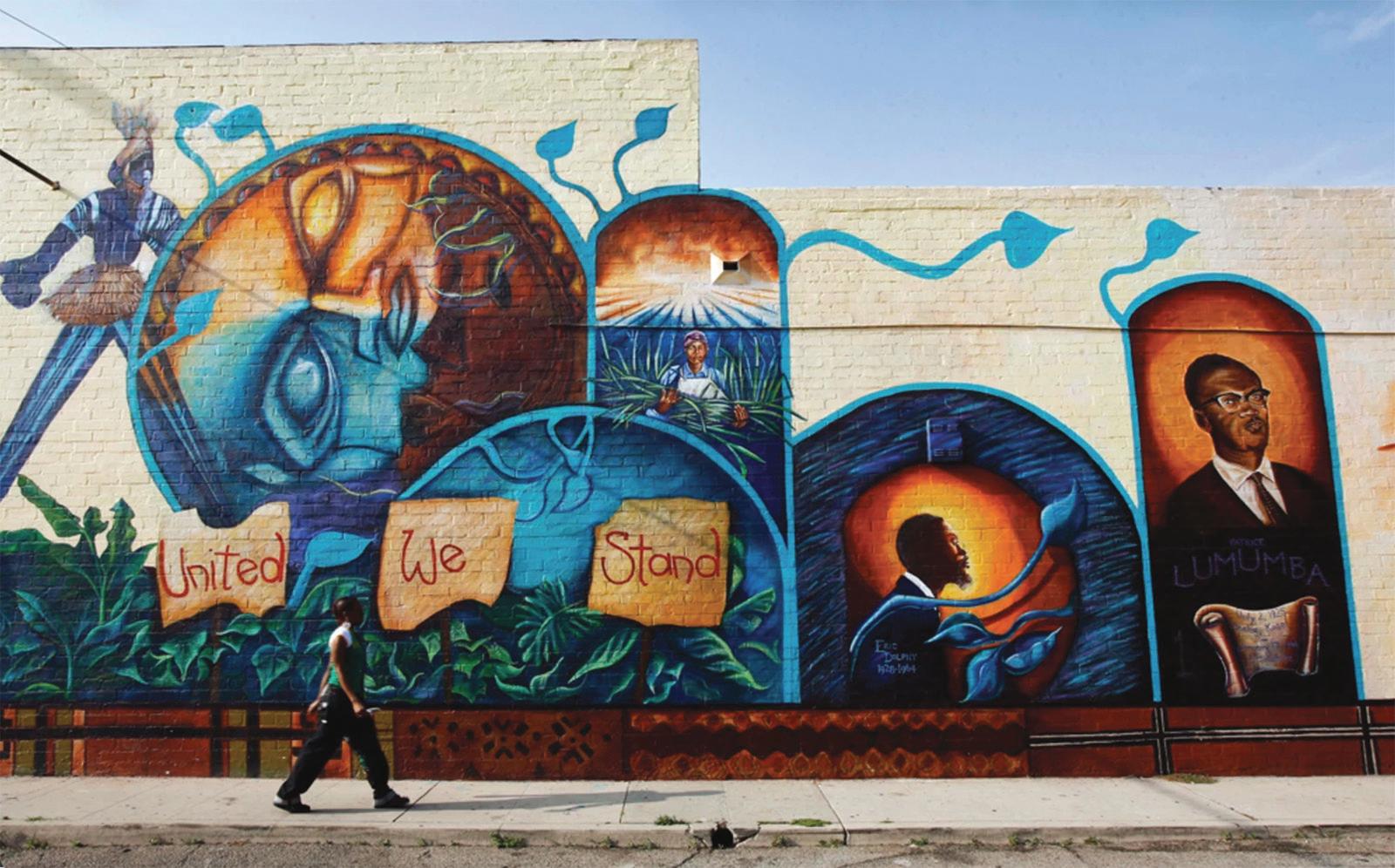
California already leads the AI industry, home to 32 of the world’s top 50 AI companies. Recent state efforts include partnerships with companies like NVIDIA to train students and workers and to use GenAI in state agencies to ease traffic congestion and improve services. In 2023 and 2024, Newsom also signed laws
targeting deepfake election content, AI scams, and digital likeness protections for performers.
California U.S. Senators Raise Alarm Over Trump Admin Sharing Personal Medicaid Data With ICE
California’s U.S. Senators Alex Padilla and Adam Schiff are raising alarm over reports that the federal government is sharing Medicaid recipients’ personal health information with immigration authorities.
In a letter to top officials at the U.S. Department of Health and Human Services (HHS) and the Department of Homeland Security (DHS), Padilla and Schiff called for an immediate end to the data sharing and demanded that any information already transferred be destroyed.
“We are deeply troubled that this administration intends to use individuals’ private health information for the unrelated purpose of possible enforcement actions targeting lawful noncitizens and mixed status families,” the senators wrote. “The decision by HHS to share confidential health information with DHS is a remarkable departure from established federal privacy protections that should alarm all Americans.”
The June 10 transfer reportedly included names, addresses, Social Security numbers, and immigration status of Medicaid enrollees, despite objections from the Centers for Medicare and Medicaid Services (CMS) officials. CMS warned that “multiple federal statutory and regulatory authorities do not permit CMS to share this information with entities outside of CMS,” according to the letter.
The senators are requesting legal justification for the data transfer and they are asking HHS to identify which states were involved, how the information was shared, and how DHS plans to use it. California is one of seven states reportedly targeted.
Padilla and Schiff emphasized that federal privacy laws, including the Privacy Act and HIPAA, limit how agencies may use or share personally identifiable health data. They are calling for full transparency, cancellation of any informationsharing agreements between HHS and DHS, and a return to policies that safeguard public trust in health programs like Medicaid.
The lawmakers have given federal officials until July 9 to respond.
Report: Mass Deportations Will Hit California Economy Hard
A new economic report warns that federal immigration enforcement crackdowns could deal a major blow to California’s economy by targeting undocumented immigrants who make up a critical part of the workforce.
The study found that of California’s 10.6 million immigrants, about 2.28 million are undocumented. They make up nearly 8% of all workers in the state. These workers help generate nearly 5% of the state’s gross domestic product (GDP) through direct wages. When indirect economic effects are included, that number rises to
almost 9%. Undocumented workers also contribute more than $23 billion annually in local, state, and federal taxes.
“Undocumented immigrants are deeply woven into the fabric of California’s economy,” stated the report. “Mass deportation policies would cause wide-scale disruptions in key industries and harm communities across the state.”
The report highlights the potential losses in sectors like agriculture and construction. Undocumented workers make up more than a quarter of California’s farm labor force. Without them, the state’s agricultural GDP could fall by 14%. In construction, 26% of the workforce is undocumented. Removing them could shrink the sector’s GDP by nearly 16%, worsening an already severe labor shortage.
The report also includes interviews with business and community leaders who say increased immigration enforcement is already causing worker shortages and hurting local economies. Many expressed support for federal legalization measures to protect undocumented workers and reduce uncertainty in the labor market.
With nearly one-third of California’s population born outside the U.S., the state’s economy is especially vulnerable to abrupt changes in immigration policy. Researchers say that disruptions in California would ripple through the national economy.
A group of California legislators, including Sen. Lola Smallwood-Cuevas (D-Los Angeles) and Assemblymember Mia Bonta (D-Alameda) – both members of the California Legislative Black Caucus (CLBC) – also signed a letter last week addressed to members of California’s delegation in Congress, warning them that the ramped-up immigration crackdown will harm the state’s economy.
“According to the conservative-leaning American Enterprise Institute, California’s economy, along with much of the nation, is largely dependent on foreign-born labor,” the legislators wrote.
“Nationwide, about 1 in 5 jobs are filled by people born abroad, and in California, it’s about 1 in 3. Immigration has long been key to the growth of California’s economy, particularly in industries such as homebuilding, construction, tech, leisure and hospitality, health care and agriculture.”
Newsom Declares LGBTQ+ Pride Month and Slams Federal Cut to Suicide Hotline Support
Gov. Gavin Newsom last week declared June as LGBTQ+ Pride Month in California and condemned the Trump administration’s decision to cut suicide prevention services for LGBTQ youth. In a proclamation issued June 16, Newsom reaffirmed the state’s commitment to equality, inclusion, and support for LGBTQ communities. The proclamation highlighted the ongoing fight for civil rights and safety, noting that more than 600 anti-LGBTQ bills have been introduced across the United States this year. It also pointed to alarming 2023 data showing that over 20% of hate crimes were motivated by anti-LGBTQ bias, especially against Black transgender women.
“California supports and celebrates the LGBTQ community as they take pride in who they are and whom they love,” Newsom stated. He also noted the historical significance of Pride Month and reminded Californians that the struggle for full equality is far from over. The governor’s statement came the same day the federal government announced it will end specialized support for LGBTQ callers through the 988 Suicide and Crisis Lifeline. The Trevor Project, which provided this service, helped more than 231,000 callers through the 988 hotline in 2024 alone. The change will take effect July 17. Newsom criticized the move as harmful and dangerous. “Cutting off a proven lifeline for people in need is outrageous and inexcusable,” he said. “While this federal administration slashes services and tries to erase LGBTQ people, California will do the opposite.” In response, Newsom pointed to California’s $4.7 billion Master Plan for Kids’ Mental Health and continued partnerships with the Trevor Project. The state also operates 12 local crisis centers to support 988 callers and offers additional mental health resources through programs like CalHOPE.
President Joe Biden Commemorating Juneteenth
By Joseph R. Biden, Jr.
46th President of the United States: 2021—2025The people of Galveston, Texas, have been commemorating Juneteenth since the Civil War ended. Yesterday, in honor of the 160th anniversary, I went there to join them.You can read about the events of Juneteenth, but there’s nothing quite like going to Galveston and seeing where it all happened.After General Robert E. Lee surrendered at Appomattox Court House on April 9, 1865, Union troops marched across the South for two months, freeing enslaved people along the way. Their final stop was Galveston, an island off the Gulf coast of Texas. There, on June 19, 1865, Union troops went to Reedy Chapel, a church founded in 1848 by enslaved people, and posted a document titled simply “General Order #3.”“The people of Texas are informed,” it said, “that, in accordance with a Proclamation from the Executive of the United States, all slaves are free.”We can only imagine the joy that spread through Galveston – and across the state and nation – on that day and those that followed.Yesterday, there was once again joy in Galveston, with a parade, picnic, and fireworks. There was also great solemnity, because
Juneteenth is a sacred day – a day of weight and power.The Book of Psalms tells us: “Weeping may endure for a night, but joy cometh in the morning.” Juneteenth marks both the long, hard night of slavery and subjugation, and the promise of that joyful morning to come.As President, I had the great honor of signing the law declaring Juneteenth a federal holiday. It was our nation’s first new federal holiday since Martin Luther King, Jr. Day was created in 1983.Our federal holidays say a lot about who we are as a nation. We have holidays celebrating our independence… the laborers who build this nation… the servicemembers who served and died in its defense.And now, we also have a national holiday dedicated to the emancipation of enslaved Black Americans.Signing that law was one of my proudest acts as President.Yet for 156 years, Juneteenth was not written about in textbooks or taught in classrooms. Still today, there are those who say it does not deserve a holiday. They don’t want to remember the moral stain of slavery and the terrible harm it did to our country.I’ve always believed that we need to be honest about our history, especially in the face of ongoing efforts to erase it. Darkness can
hide much, but it erases nothing. Only with truth can come healing, justice, and repair.I also believe that it’s not enough to commemorate the past. We must also embrace the obligation we have to the future. As Scripture says, “Faith without works is dead.” And right now, we Americans need to keep the faith and do the work.In honor of Juneteenth, let’s help people register to vote.For decades, we fought to expand voting rights in America. Now we’re living in an era when relentless obstacles are being thrown in the way of people trying to vote. We can’t let those tactics defeat us. In America, the power belongs with the people. And the way we show that power is by voting.So let’s reach out to family, friends and neighbors – especially those who have never voted before. Remind them that with voting, anything is possible. And without it, nothing is possible.Yesterday in Galveston, we gathered in Reedy Chapel to commemorate Juneteenth, just like people have done for 160 years and counting. We prayed, sang, and read General Order #3 again. The pews were full of families. How many people must have prayed for freedom inside those walls. How many must have sent fervent thanks to God when slavery finally ended.I remembered the words of my late friend John Lewis. He said, “Freedom is not a state. It is an act.”Juneteenth did not mark the end of America’s work to deliver on the promise of equality. It only marked the beginning. To honor the

A vibrant mural in Leimert Park, one of the neighborhoods set to be recognized through California’s new Black Cultural District initiative. (Photo Credit: Joey Zanotti via Flickr)
Gov. Gavin Newsom outlines a state policy plan on artificial intelligence, emphasizing safe innovation and public protections. (Photo Credit: Office of the Governor of California / Wikimedia Commons)
Former President Joe Biden.
“Sound of Something Better”: AERO Act Takes Flight with Promise of Jobs, Growth and Airport Reinvestment in Kern County

By Jason Land Jr.
In an effort to strengthen California’s airport infrastructure and ensure compliance with federal regulations, Senator Melissa Hurtado (D-Bakersfield) hosted a press conference at Meadows Field Airport on Friday afternoon, June 20th. Joined by Director of Kern County Airports
Michael Musca, Kern County Supervisor Jeff Flores, Bakersfield Mayor Karen K. Goh, and other
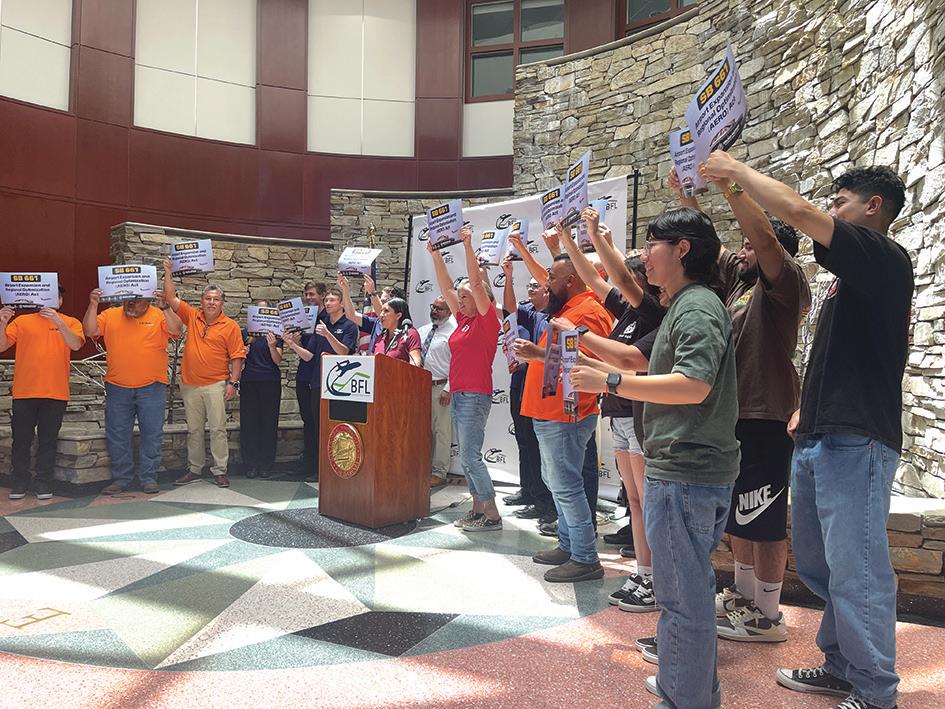
Airport staff, union members, and representatives from California Aeronautical University (Photo:
community leaders, the senator formally introduced Senate Bill 661– also known as the AERO Act. The bill seeks to redirect existing sales tax revenue from jet fuel– currently deposited into the state’s General Fund– into the Aeronautics Account to fund airport
and aviation improvements across California.
The AERO Act aims to create a stable, longterm source of funding to help airports modernize infrastructure, attract more air service routes, and meet rising demands for passenger and cargo travel. Standing just steps from the TSA screening gates inside the airport’s rotunda, Senator Hurtado emphasized how the bill would bring meaningful investment back into regional airports like Meadows Field, benefitting not only the physical infrastructure, but the workers, travelers, and surrounding communities. Attendees included airport staff, union members, and representatives from California Aeronautical University– all unified by a shared mission to bring federal compliance, economic growth, and reinvestment into the heart of the Central Valley.
David Martinez, President of Communications Workers of America Union Local 9416, opened the press conference by sharing a heartfelt message about the workers of Meadows Field. He spoke of the pride, professionalism, and grit that his members bring every day– greeting travelers with smiles, ensuring safety in extreme heat or rain, and helping families travel with peace of mind. Yet despite their dedication, these hardworking employees have gone a year and a half without a contract, often working multiple jobs just to merely survive. Martinez called on P1 Airlines to return to the table and negotiate a fair agreement– one that includes safer boarding conditions, quality healthcare, and better wages. He stated clearly: SB 661 is about more than aviation–it’s about accountability, reinvestment, and supporting the working families that keep airports running.
Senator Hurtado followed Martinez’s remarks by acknowledging the financial pressures many Californians are facing. She spoke candidly about how easy it can feel to stay in the dark, but reminded everyone that the Central Valley is a resilient community, and that SB 661 represents hope. “There’s a sound of something better in Kern County,” she said, reaffirming her belief in the promise of Meadows Field Airport. She stressed that without reinvestment, regional airports like Bakersfield risk falling behind, while others across the country surge forward. Hurtado urged continued public support for SB 661 to ensure that the funding– already being collected– goes back where it belongs: into infrastructure, employees, and local growth. Supervisor Jeff Flores built upon the remarks of Senator Hurtado, describing the bill as another
historical milestone for Meadows Field that added to its legacy of international flights, terminal upgrades and new flight services. He emphasized that Meadow’s Field is a critical asset to Kern County’s economic development, providing an accessible, competitive alternative to larger hubs like Los Angeles. “With the right investment,” he said, “Meadows Field can become a true economic engine, creating jobs and new opportunities across the region.” He closed by thanking Senator Hurtado for her leadership and vision.
Bakersfield Mayor Karen Goh echoed the optimism, referencing Senator Hurtado’s earlier statement: “Today we are celebrating the sound of something better– and indeed, this bill is the sound of something better!” Goh emphasized how quickly Bakersfield is expanding and how SB 661 will help to keep the airport expanding with it. With better infrastructure, more flight options, and higherpaying jobs, the bill offers real value to families and businesses alike. She noted that the bill not only supports existing local industries, but will attract new ones and increase tourism, further positioning
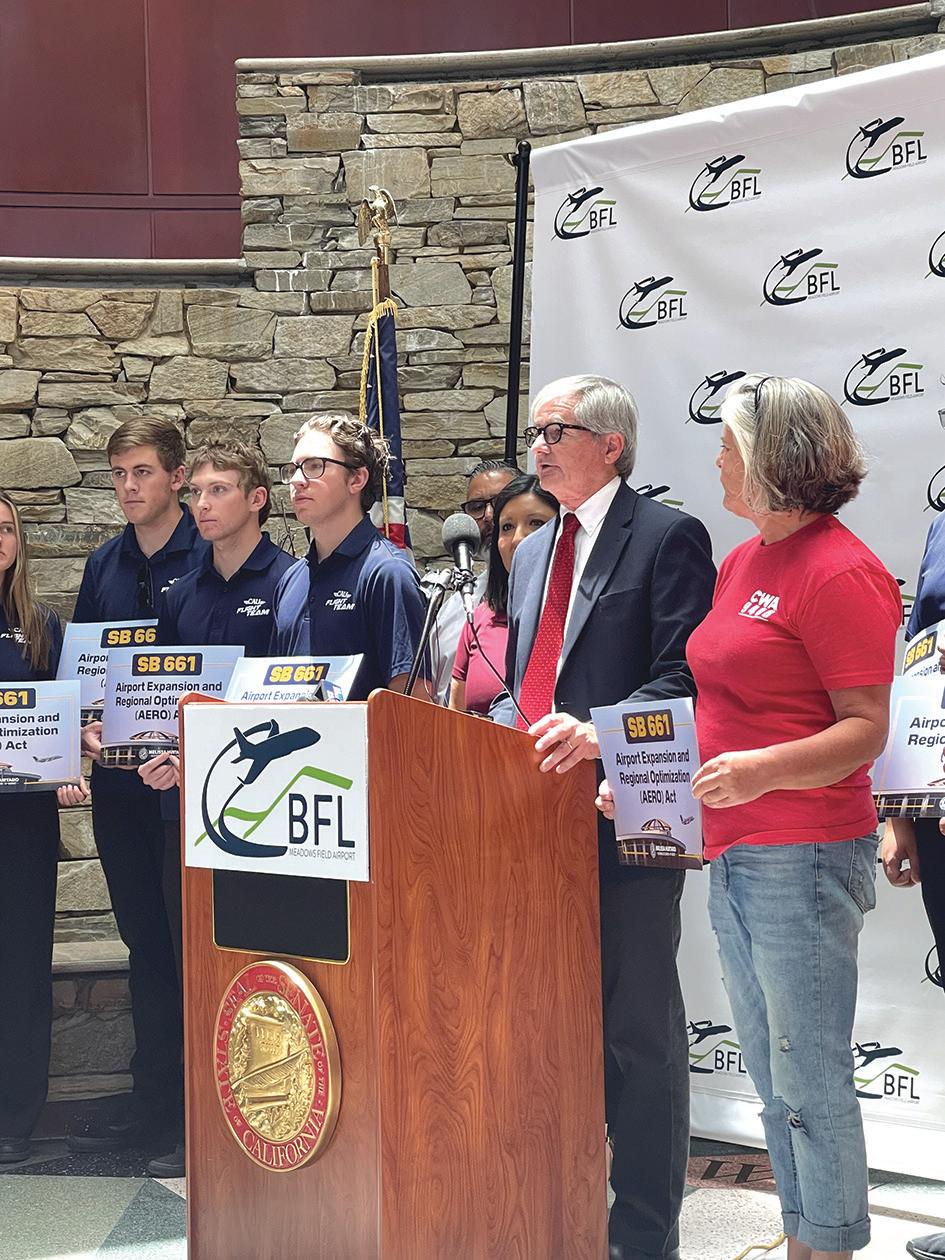

Bakersfield as a regional hub. Mayor Goh concluded with a full endorsement of SB 661 on behalf of the City of Bakersfield. Michael Musca, Interim Director of Kern County Airports, continued the discussion by thanking Senator Hurtado and all the local officials for their support. He highlighted the importance of directing existing aviation taxes back into the airports, noting that the bill demonstrates a strong understanding of how regional airports contribute to long-term economic growth. Musca affirmed that with SB 661, Meadows Field is positioned to modernize, expand service, and create a more prosperous future for the community it serves. Senator Hurtado closed the event by reiterating a key point: SB 661 does not introduce a new tax– it simply ensures that an existing one is used as it was intended. With the support of workers, city leaders, and community members behind it, the AERO Act represents a chance to reinvest in infrastructure, strengthen local economies, and uplift the families working hard to make regional air travel possible.
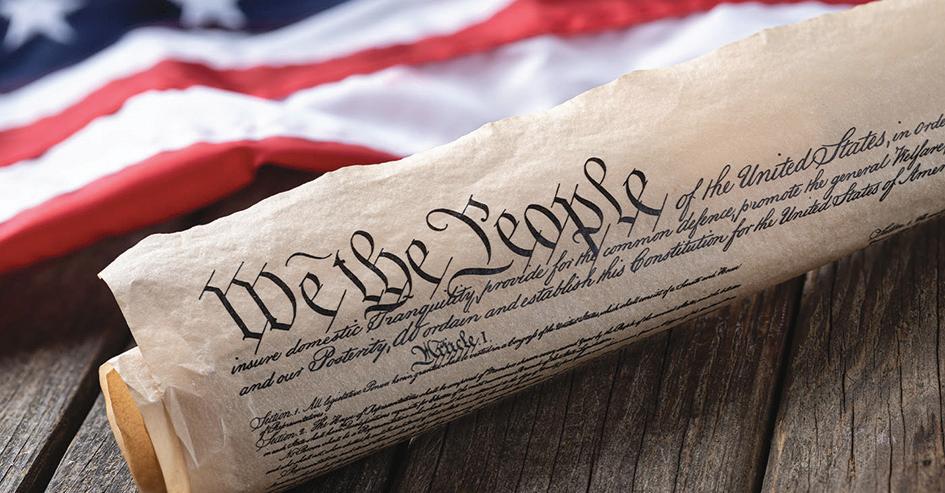
The Constitution and Immigration Chaos
Bakersfield Mayor Karen Goh (Photo: Jason Land, Jr.)
Jason Land, Jr.)
Bakersfield Mayor Karen Goh, David Martinez, and Melissa Hurtado (centered to right) with Airport staff and union members. (Photo: Jason Land, Jr.)
Interim Director of Kern County Airports
Michael Musca. (Photo: Jason Land, Jr.)
